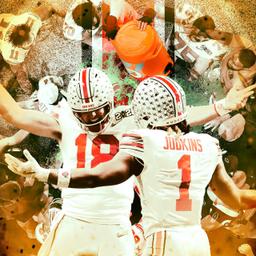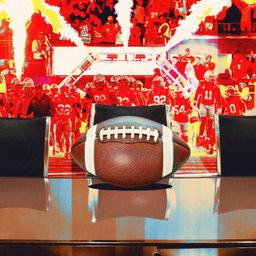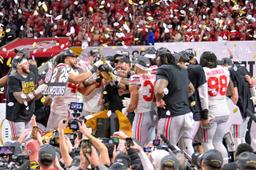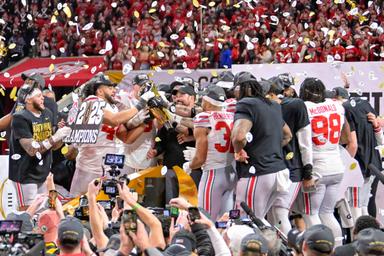After Ohio State won the national championship, Chip Kelly stood on the field talking about the biggest play call of the game. Kelly—and this fact still feels supremely weird—is Ohio State’s offensive coordinator.
The play came with 2:45 left in the title game. Ohio State was facing a third-and-11. The Buckeyes were up by eight but needed a first down so that Notre Dame couldn’t lurch fully back to life.
Notre Dame rushed seven. Buckeyes quarterback Will Howard threw an arcing deep ball to freshman wide receiver Jeremiah Smith, who’d drawn one-on-one coverage. The play went 56 yards.
That play won the game, a reporter suggested to Kelly.
“A lot of things won the game,” said Kelly, standing in a litter of football-shaped confetti.
But was it a gutsy call? a reporter asked, fishing for some celebratory back-patting.
“It’s only a gutsy call if it doesn’t work,” said Kelly.
What’s it like to finally have a trophy on your mantle?
“It’s not on my mantle,” said Kelly. “It’s on our players’ mantle.” His tone was even and businesslike, and he batted away our contentions in the way the Irish failed to do with Smith’s big catch.
When I’d gone looking for Kelly on the field after the game, I first found his boss, Buckeyes coach Ryan Day, walking around with a giddy, disbelieving smile. There’s a corner of the college football multiverse, I thought, where Kelly is taking that champion’s walk as a head coach. His smile would be neither giddy nor disbelieving.
In Atlanta, before the game, Kelly got to talking about his strange career arc. “This isn’t a scripted deal,” he told reporters. Of course it isn’t. Who would write a script that had a coach failing at multiple top jobs—and simply bailing on the last one—only to regain his guru status when he became a coordinator? Wade Phillips Productions?
Let’s review. Back in 2010, Chip Kelly was the head coach of the Oregon Ducks. He was 47 years old—not shockingly young but schematically shiny and new. In Kelly’s second season, the Ducks made the national championship game only to lose to Auburn and Cam Newton.
Kelly spent four years in Eugene as head coach, and each of his Ducks teams had double-digit wins and made a major bowl. Before the NFL sniffed at hiring college coaches, Kelly was a top prospect. In 2013, the Philadelphia Eagles hired him to replace Andy Reid. That didn’t go well. Despite the fact that Kelly had (or because he had) control of personnel, his teams made one playoff appearance in three years and became a case study for why the NFL sniffs at hiring college coaches. The 49ers scooped up Kelly after he got fired. He went 2-14 and got fired again.
By 2018, Kelly was a dimming star. You could tell when he chose UCLA as the place to make his comeback. I’m not sure what’s remarkable about Kelly’s six seasons with the Bruins except for his standoffish nature (a horrible fit in L.A.), the empty seats in the Rose Bowl, or his up-and-down teams that would beat USC one week and then lose to a sub-.500 Cal team the next.
Last February, Kelly basically fired himself. He left his head coaching job at UCLA to become offensive coordinator and quarterbacks coach at Ohio State.
At the time, Kelly was asked why he’d given up the big job. He told a story about filling in for his departed Bruins quarterbacks coach while his team got ready for its bowl game. He liked the smallness of the job. “I haven’t seen you this happy in a long time,” his wife said.
Kelly admitted that coaching had become a “CEO operation,” a never-ending battle of acquisition and retention. That was hard to do at a non-power like UCLA, and Kelly hadn’t done a good job of it, in any case. So he went to work at a power school as an assistant for Day, whom he’d coached with in college and the pros. “I just want to be happy,” said Kelly.
Kelly’s happy place had one of the most talented rosters in the country. Ohio State had recruited receivers like Smith and running backs like TreVeyon Henderson. The Buckeyes used the portal to fill in the gaps in a way Kelly never could have at UCLA. The Buckeyes got Howard from Kansas State and running back Quinshon Judkins from Ole Miss. The roster reportedly cost $20 million.
If Kelly wasn’t especially likable, well, that no longer mattered. Day was the callow coach who lost to Michigan and feuded with Lou Holtz. Kelly’s aura, diminished as it may be, gave Day some breathing room. And, Day said Monday night, more time to spend thinking about his defense.
One of the fun parts of championship weekend was listening to Kelly speak in coach’s koans that would impress even his new boss. On working in Eugene versus Columbus (and quoting Teddy Roosevelt): “Comparison is the thief of joy.” On Ohio State’s late-season loss to Michigan: “It could be your tombstone or it could be a stepping stone.” On the plays he likes to call: “good ones.”
It’s unfair to say that Kelly merely made use of Ohio State’s expensive toys. Outside of a few games like Michigan, Kelly made excellent use of them. You could see that on Monday.
On Ohio State’s first drive of the game, Smith ran toward his quarterback like he was going to take a handoff from him—as he’d done four plays earlier. This time, Smith took a few steps toward Howard, stopped, and raced back toward the sideline. Howard found him for a walk-in touchdown.
Kelly’s offense scored touchdowns on its first four possessions. The Buckeyes led 31-7 in the third quarter. Then Notre Dame stopped calling running plays that would have made Frank Leahy proud. Suddenly, a game that felt like it was going to be a tribute to Ohio State’s style of roster-building was 31-23.
The Smith catch was one of those play calls that felt like it was coming all night long. It came at the least likely time, which is part of the reason it worked. The next thing you knew, the Buckeyes had a first-and-goal at the Notre Dame 10-yard line. Day was running down the sideline, arms stretched in the air. Ohio State drained most of the remaining time and kicked a clinching field goal.
After the game, Kelly became a quote in stories that were about other people. Wearing a Buckeyes baseball cap, he talked about Howard (“awesome”), the senior leaders (“amazing”), and Day’s ecstatic celebration (Kelly missed it because he was busy calling the next play). Often, he disputed the writer’s premise before answering.
I asked Kelly how winning a big game as a coordinator compared to the games he won as a head coach.
“I don’t compare anything,” said Kelly. You know what Teddy Roosevelt said …
“I’m just really, really proud of my players,” he continued. He corrected himself. “Of the players. I’m just so happy for them because I’ve seen what they’ve gone through. That’s where you gain your joy as a coach, kind of vicariously through them. And to see the smiles on their faces. Because they worked so hard for it. That’s where I get my joy from.”
It’s a testament to Chip Kelly’s strange career that he finally found that joy in the skybox.




